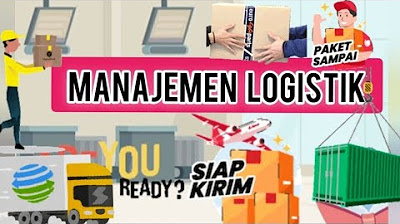Module 4: Move It: Transportation and Logistics - ASU's W. P. Carey School
Summary
TLDRThe script delves into the intricacies of logistics beyond mere transportation, emphasizing the complex journey products undertake to reach consumers. It illustrates the multi-step process of travel, from origin to destination, drawing parallels to air travel's extensive procedures. The narrative underscores the critical role of logistics executives in decision-making for packaging, documentation, and transportation modes, which dictate supply chain strategies. It also introduces freight forwarders as specialists navigating the logistics industry's challenges, highlighting how modern logistics management has transformed global trade and consumer access to diverse products.
Takeaways
- 🛒 Consumers often overlook the complexity behind the supply chain, focusing mainly on the product and its price.
- 🌍 The origin and destination of a product are just the beginning of the logistics story; the journey involves many steps and processes.
- ✈️ The analogy of air travel highlights the detailed and multi-step nature of logistics, beyond just the main mode of transport.
- 🧳 The process of traveling by airplane, including ticketing, packing, airport procedures, and layovers, mirrors the complexity of product logistics.
- 👩💼 Supply chain managers play a critical role in planning and preparing logistics, as products cannot make decisions or ask questions during transit.
- 📦 Logistics encompasses a wide range of activities including packaging, containerization, documentation, insurance, storage, and regulatory compliance.
- 🚚 Transportation is a key aspect of logistics, influencing how supply chain managers develop comprehensive logistical plans.
- 🌐 The vastness of the world and the diversity of products make logistics a complex and intimidating field, even for experienced executives.
- 🔍 The existence of freight forwarders as a specialized industry indicates the complexity of logistics and the need for expert guidance.
- 🛍️ Every product or service has a unique logistics story, from the journey of grocery items to the origins of every part in a car.
- 💭 Encourages consumers to consider the modern logistics management behind their purchases and how it has transformed their lives.
Q & A
What is the primary focus of consumers when they are at the store?
-Consumers tend to focus on products and their prices when they are at the store, rarely considering the origin or the logistics involved in bringing the items to the store.
Why is the term 'Logistics' used to describe the process of moving goods?
-The term 'Logistics' is used because it encompasses much more than just transportation. It includes planning and preparation aspects such as packaging, containerization, documentation, insurance, storage, and regulations for importing and exporting.
How does the process of traveling by airplane compare to the logistics of moving products?
-While traveling by airplane is complex, involving multiple steps and decisions, moving products is even more complex because they cannot make changes or ask questions, requiring meticulous planning and preparation by logistics professionals.
What are the responsibilities of a Logistics Executive in supply chain management?
-Logistics Executives are responsible for making decisions related to packaging, containerization, documentation, insurance, storage, and adhering to importing and exporting regulations.
Why is transportation an important aspect of logistics?
-Transportation is important because the mode of transportation chosen will likely dictate how a supply chain manager will plan the entire logistical process.
What is the role of freight forwarders in the logistics industry?
-Freight forwarders are cargo travel agents who guide clients through the complex details of logistics, helping to plan the delivery of cargo across various industries and destinations.
How has modern logistics management impacted the availability of products in our daily lives?
-Modern logistics management has made it possible for a wide variety of products, from exotic fruits to imported vehicles, to be available by efficiently managing the complex process of moving goods from origin to destination.
What is the significance of considering the logistics story behind every product we purchase?
-Understanding the logistics story behind products helps us appreciate the complex processes and planning that go into making those products available to us, and how logistics management has transformed our lives.
How does the logistics process for a single product compare to moving oneself from one city to another?
-While moving oneself from one city to another is challenging, the logistics process for a product is more complex as it involves planning and execution without the ability for the product to make decisions or ask questions.
What are some of the steps involved in the logistics process for a product?
-The logistics process for a product may include packaging, containerization, documentation, insurance, storage, transportation, and compliance with import/export regulations.
Why might logistics be intimidating for even experienced executives?
-Logistics can be intimidating due to the vastness of the world, the diversity of items that need to be moved, and the need to navigate complex regulations and processes across different industries and destinations.
Outlines

This section is available to paid users only. Please upgrade to access this part.
Upgrade NowMindmap

This section is available to paid users only. Please upgrade to access this part.
Upgrade NowKeywords

This section is available to paid users only. Please upgrade to access this part.
Upgrade NowHighlights

This section is available to paid users only. Please upgrade to access this part.
Upgrade NowTranscripts

This section is available to paid users only. Please upgrade to access this part.
Upgrade NowBrowse More Related Video

What is Logistics Management? Meaning, Importance, Basic Functions & Strategies - AIMS UK

Manajemen Logistik #1 Pengantar

What is Logistics & Logistics Management | What are Modes of Transport | How to select TransMode

Logistics Management in 12 minutes

#135 Supply Chain Management vs Logistic (Part 1)

What is a Core i3, Core i5, or Core i7 as Fast As Possible
5.0 / 5 (0 votes)